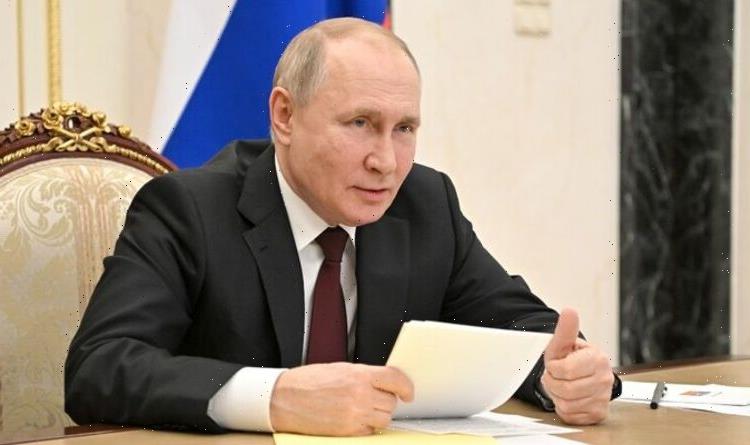Forces Minister: 'Putin continues to prepare for an invasion'
We use your sign-up to provide content in ways you’ve consented to and to improve our understanding of you. This may include adverts from us and 3rd parties based on our understanding. You can unsubscribe at any time. More info
With reports emerging that up to 150,000 Russian troops are now stationed at the border with Ukraine, the West has been scrambling to prevent an attack. European Commission President Ursula von der Leyen has warned of “massive” economic sanctions, while US President Joe Biden has said there will be “severe” consequences for Russia if it invades. But despite these stark warnings, it might appear as if Mr Putin may have come out “victorious” as these sanctions could backfire and divide NATO allies.
@MumbaichaDon created a thread on Twitter explaining how “President Putin has come out Victorious without firing a single bullet”.
He wrote: “Natural Gas by the numbers:
“Russia exports 23.3 billion cubic feet per day (72 percent to Europe)
“US exports 9.6 billion cubic feet per day.
“Russian gas to Europe costs as little as $270 (£199) per 1000 cubic feet (Germany)
“US gas is sold at market prices, $1000 (£734) + per 1000 cubic fee.”


This could imply that, if Western sanctions were to target Russian energy and gas companies, Moscow could strike back by slashing gas which Europe largely depends on.
And the US “does not produce enough natural gas anywhere near to fill any void left by Russia and sells at prices up four times higher”.
@MumbaichaDon added: “For Europe, which is already in the midst of an energy crisis, consequences of sanctioning Russian gas would be catastrophic.”
This may mean explain why countries like Germany have been more hesitant to explicitly state which sanctions they would slap down on Russia.

German Chancellor Olaf Scholz has been slammed for not saying whether he would scrap the Nord Stream 2 pipeline.
This is the £8billion gas project that would transit gas from Russia to Germany via the Baltic Sea, bypassing Ukraine and Poland en route.
Mr Putin has repeatedly called for the pipeline to come online but its certification has been suspended by German regulators.
The US has traditionally voiced its opposition to this project and, despite being waved by the Biden Administration, has called for it to be scrapped if Russia invades Ukraine.
@MumbaichaDon said: “Putin opened doors for the Nord Stream 2 project with Germany which was stalled by US since 2020 as Germany was forced by Putin to go against the US to meet gas requirements.
DON’T MISS
Macron fury as UK’s Galileo replacement storms ahead [REPORT]
UK food crisis: Russia export ban prompts price spike warning [INSIGHT]
Call for tougher rules as new variant may be ‘more lethal’ [REVEAL]

“This is the crux of the Ukraine Conflict. The target was always Germany.
“Without firing a single shot, Putin exposed impotence and lack of decision making of US and NATO.”
But despite not explicitly stating whether he would cancel Mr Putin’s much-wanted pipeline, Mr Scholz still claims the US has his full support.
He told reporters: ““I want to be absolutely clear, we have intensively prepared everything to be ready with the necessary sanctions if there is military aggression against Ukraine.
“There won’t be any measures in which we have a differing approach. We will act together. We are absolutely united.”

It could be argued that the whole purpose of mounting pressure on Ukraine in the first place was to divide NATO so Mr Putin could create a “new world order”.
Ukrainian International Advisor Ms Zalishchuk told Express.co.uk: “Simply put, Putin is trying to renegotiate a new global order while the collective West is negotiating the de-escalation in Ukraine.
“An operational Nord Stream 2 is a crucial element of this new world order in the Kremlin’s vision.“
The term “new world order” refers to a new period of history evidencing a dramatic change in world political thought and the balance of power in international relations.
Source: Read Full Article
